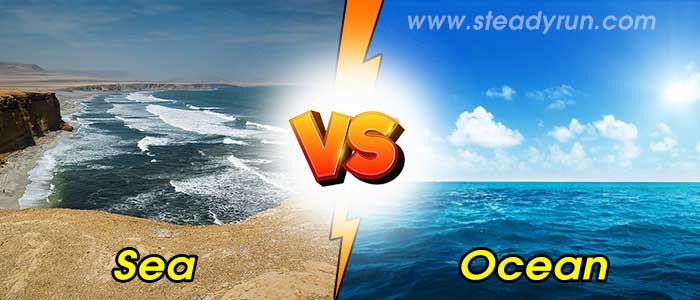
Distinguish, differentiate, compare and explain what is the Difference between Sea and Ocean. Comparison and Differences.
Sea
Sea are smaller as compared to ocean. Sea are usually located where the land and the ocean meets. Typically seas are partially enclosed by lands. A large body of salt water in an inland location that may or may not be connected to the ocean. For instance, the Philippine Sea is connected to the Pacific Ocean. It may also be a large salt-water lake such as the Caspian Sea with no natural outlet.
Ocean
Ocean are large bodies of water (as the Atlantic ocean) into which the great ocean is divided. Ocean is the vast body of salt water that covers 71 percent of the Earth's surface and contains 97 percent of the planet's water. An ocean is a very large area of salt water. Most of the Earth is covered in ocean.
There are five oceans in the world:
- Pacific Ocean: The Pacific Ocean is the biggest ocean in the world. It reaches from North and South America to Asia and Australia
- Atlantic Ocean: The Atlantic Ocean is the second biggest ocean in the world. It reaches from North and South America to Europe and Africa.
- Indian Ocean: The Indian Ocean is the third biggest ocean in the world. It is named after the country of India. The Indian Ocean is home to many endangered sea creatures, including turtles, seals and dugongs (also known as sea cows).
- Southern Ocean: The Southern Ocean is the second smallest ocean in the world. It is also known as the Antarctic Ocean as it surrounds Antarctica. It is the coldest and wildest ocean in the world.
- Arctic Ocean: The Arctic Ocean is the smallest ocean in the world. It surrounds the Arctic. Often, the Arctic Ocean is completely covered in ice.
Why Are Oceans so Important?
Oceans make up over 70% of the Earth’s surface. There are over 700,000 different species of animal that live in the ocean. It is important to protect the oceans to make sure their habitats are safe.
The ocean is also full of tiny plants which help to produce oxygen, which we need to breathe. On top of this, oceans also provide food for many creatures, including humans!
Difference between Sea and Ocean
Let's differentiate sea and ocean on various technical factors:
1. Size: One of the main differences between seas and oceans is their size. Oceans are larger bodies of saltwater that cover a significant portion of the Earth's surface, while seas are smaller and typically located along the coastline.
2. Depth: Oceans are generally deeper than seas. The average depth of oceans can range from a few hundred meters to several kilometers, while seas tend to be shallower in comparison.
3. Connection to land: Seas are partially enclosed by land, often forming a border between land and ocean. Oceans, on the other hand, have no such boundaries and are vast, open bodies of water.
4. Salinity: Oceans are typically more saline than seas. The salinity level in oceans is relatively constant and averages around 3.5%, while seas can vary in salinity depending on factors such as freshwater inflow from rivers or evaporation rates.
5. Biodiversity: Oceans are known for their rich biodiversity, supporting a wide variety of marine life due to their size and depth. Seas also harbor diverse ecosystems but may have slightly different species compositions depending on their location and specific conditions.
6. Geological features: Oceans often feature unique geological formations such as trenches, ridges, and underwater mountain ranges. Seas may not exhibit as many distinct geological features but can still have interesting coastal formations like cliffs, bays, and coral reefs.
7. Navigability: Due to their vastness, oceans provide major shipping routes connecting different continents and countries. Seas, being smaller and closer to land, are more frequently used for local transportation and fishing activities.
8. Climate impact: Oceans play a crucial role in regulating global climate patterns by absorbing heat from the atmosphere and redistributing it through currents. Seas have a smaller influence on global climate but can still have localized effects on weather conditions in coastal areas.
In summary, while both seas and oceans are bodies of saltwater, the main differences lie in their size, depth, connection to land, salinity, biodiversity, geological features, navigability, and climate impact.
Tags:
Difference between Ocean vs Sea
Sea vs Ocean
Differences between Ocean vs Sea
Image Credits: Freepik







